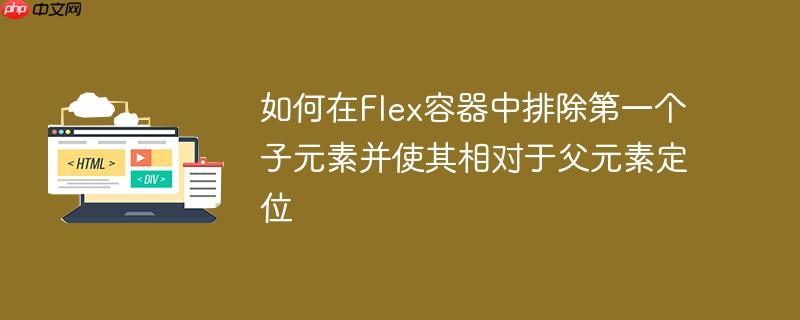
本文介绍了如何在Flexbox布局中将第一个子元素排除在Flex计算之外,并使其相对于父容器进行绝对定位。通过设置父容器为position: relative,子元素为position: absolute,可以实现子元素脱离Flex布局,并根据需求进行精确定位,从而实现更灵活的布局效果。
在Flexbox布局中,有时我们需要将某个子元素(例如工具栏、徽标等)从Flex布局的计算中排除,并将其相对于父容器进行绝对定位。这可以通过结合使用position: relative和position: absolute来实现。
实现步骤:
-
设置父容器为position: relative: 将Flex容器的position属性设置为relative。这将使其成为绝对定位子元素的定位上下文。
.mycontainer { position: relative; display: flex; flex-direction: column; align-items: center; justify-content: space-between; background-color: rgb(200, 200, 200); width: 100%; }
-
设置子元素为position: absolute: 将需要绝对定位的子元素的position属性设置为absolute。
.mycontainer-bar { position: absolute; top: 0; right: 0; width: 20px; height: 20px; background-color: red; } -
使用top、right、bottom、left属性定位子元素: 使用top、right、bottom、left属性来相对于父容器定位子元素。 例如,top: 0; right: 0;会将子元素定位到父容器的右上角。
完整示例代码:
<!DOCTYPE html> <html> <head> <style> .mycontainer{ background-color: rgb(200,200,200); width: 100%; display: flex; flex-direction: column; align-items: center; justify-content: space-between; position: relative; /* Important: Set parent to relative */ } .mycontainer-bar{ width: 20px; height: 20px; background-color: red; position: absolute; /* Important: Set child to absolute */ top: 0px; right: 0px; } .row{ margin: 5px; background-color: blue; width: 80%; height: 90px; } </style> </head> <body> <div class="mycontainer"> <div class="mycontainer-bar">t</div> <div class="row">r1</div> <div class="row">r2</div> </div> </body> </html>
注意事项:
- 确保父容器的position属性设置为relative,否则绝对定位的子元素将相对于文档的根元素进行定位。
- 绝对定位的子元素将脱离Flex布局,不会影响其他Flex子元素的布局。
- 可以通过调整top、right、bottom、left属性的值来精确控制子元素的位置。
总结:
通过将Flex容器设置为position: relative,并将需要排除在Flex布局之外的子元素设置为position: absolute,可以灵活地控制子元素的定位,实现更复杂的布局需求。这种方法在创建工具栏、徽标或其他需要固定位置的元素时非常有用。记住,父元素的position: relative是关键,它为绝对定位的子元素提供了一个参考的坐标系。


